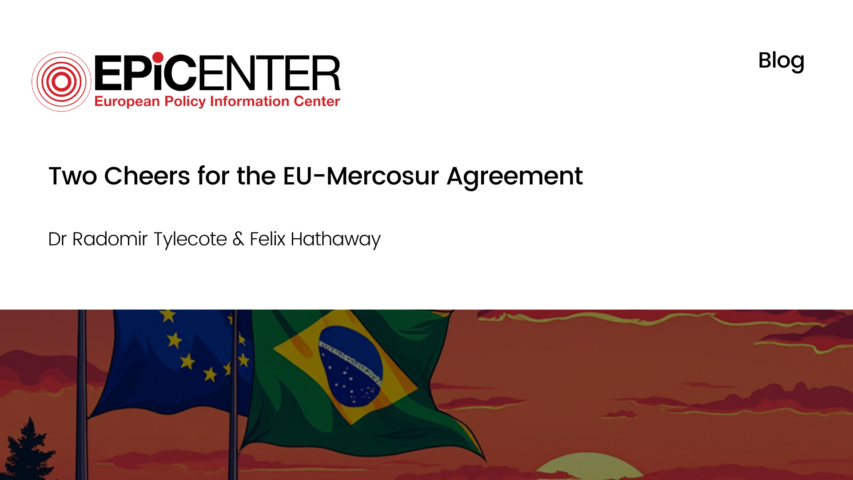Two Cheers for the EU-Mercosur Agreement

Two Cheers for the EU-Mercosur Agreement
Dr Radomir Tylecote & Felix Hathaway // 16 July 2019
There has been a great deal of cheering over the recent free trade agreement between the EU and Mercosur (the South American trade bloc of Brazil, Paraguay, Argentina and Uruguay, with Venezuela suspended). While the agreement should be welcomed, its depth may not match its considerable breadth. Furthermore, looking at the details, the agreement appears to have more to do with signalling openness and rejecting the concept of protectionism – clearly to be welcomed – than with seriously challenging liberalisation, including on the EU’s part.
This is not a surprise. As the EU’s documents make clear, the aims of the agreement are as much to “help the EU and Mercosur shape global trade rules in line with highest EU standards” and “send a powerful signal to the world… that two of its biggest economies reject protectionism” as to genuinely help consumers in either region.
First, the good. The agreement is liberalising on industrial goods tariffs and quotas, including by the EU and over 90% of lines liberalised by Mercosur. This includes key defensive sectors such as auto manufacturing, machine parts and chemicals. This will happen in a phased manner over 10-15 years (as is relatively standard) is welcome for its effect on lowering prices for EU consumers and on industrial inputs. EU based exporters are also expected to benefit, although it should be noted that even where 93% of lines are liberalised in machinery, this will only cover 67% of EU machinery exports.
More problematic are the market access provisions for agricultural goods. While Mercosur is liberalising lines corresponding to 95% of the EU’s export value, major EU defensive interests are being maintained in areas like beef, poultry, rice and sugar. For instance, the agreement only allows an in-quota rate on 180,000 tonnes of sugar into the EU (this must also be sugar for refining to protect EU industry); the beef quota of 99,000 tonnes is also low when compared to production in Member States. While these parts of the agreement constitute a step forward, particularly for Mercosur in eliminating export duties, the step is a small one, and is unlikely to have a significant impact for EU consumers.
The biggest disappointment however comes in the agreement’s coverage of regulatory barriers to trade. “rejecting protectionism” and pushing adherence to EU standards are not, ultimately, compatible. Most particularly, as the Agreement in Principle document makes clear “The EU’s SPS standards are and shall remain non-negotiable”. This is a problem. Protectionism has increasingly shifted from tariffs and quotas to that disguised as regulatory standards, but which go beyond what would be necessary to protect human and animal health and ignore scientific evidence. This means that, although there will be some reduction in tariffs, imports to the EU will have to conform to the EU’s stringent ‘farm to fork’ SPS requirements, which hinder innovation and will prevent EU consumers from taking full advantage of the higher agricultural productivity in Mercosur countries. The impact of this regime, increasingly exported by the EU via such agreements, is likely to be wealth-destroying.
This story is effectively repeated regarding Technical Barriers to Trade and Services and Establishment. Nothing that has been agreed goes far beyond basic non-discrimination and a standard commitment to basing regulations on international standards. Particularly concerning is the discussion of regulatory convergence in some of these areas and while some will derive from international standards, these appear to be derived from the EU’s definition of such standards. Decisions by the WTO TBT committee are not necessarily final, leaving the way open for continuing extension of the EU regulatory sphere into Mercosur countries.
Beyond these areas, the agreement contains relatively standard provisions for public procurement, conformity assessment, competition and sustainable development, and limited disciplines on federal-level State Owned Enterprises which ought to be welcomed. Overall however, the agreement has as much to do with apparent openness while expanding the EU’s regulatory influence than with genuine liberalisation on the EU’s part.
EPICENTER publications and contributions from our member think tanks are designed to promote the discussion of economic issues and the role of markets in solving economic and social problems. As with all EPICENTER publications, the views expressed here are those of the author and not EPICENTER or its member think tanks (which have no corporate view).



